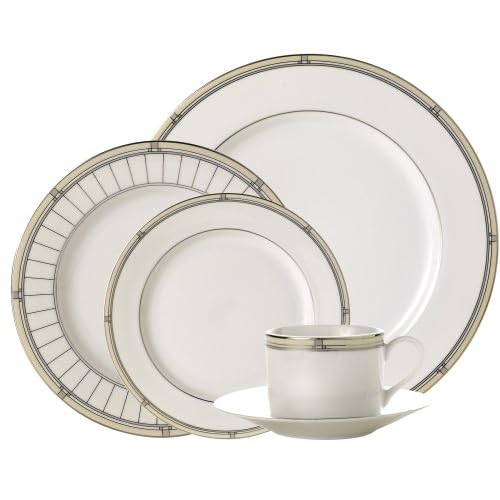Gentlemen,
I am looking for a set of classic and versatile tableware. I like the following two sets:
http://www.wedgwood.com/GB/Tableware/We ... wood_White
http://www.wedgwood.com/GB/Tableware/We ... eens_Plain
Which one of the two sets would you choose? What other sets would you recommend?
Thank you very much for your help!
Tableware / Dinnerware
If good china sets off an appetizing dish as a shirt and tie set off a face, then the surrounding frame (table, linens, glassware, flatware, room decor) should harmonize and support the effect as a suit and other accessories do a well-cut shirt collar and elegant tie. Some meals will be more formal and others more relaxed, and the dining room "dress" should be able to adapt. I've always thought that a good plan was to have one service of classic plain white china, which can be dressed up or down to accommodate both simple fare and artfully composed avant-garde cuisine, one tailored service with restrained decoration (sort of the business suit of china), and one rustic/artisanal service (probably not porcelain), such as hand-painted faience, for outdoor or more exuberant ocassions.
Of your two choices, I would prefer the Wedgwood White. It could serve as the first of my three categories, and I prefer the classic round shapes to fluted or faceted ones for plain white, as being more versatile and a better platform for contemporary food presentations, but that's a personal taste.
Since Royal Worcester was acquired recently by Portmeirion, a number of their patterns have been discontinued and have been available at dramatic discounts. I'm using this one for my "tailored" category (I prefer its can-style teacups, and it comports well with my art-deco era dining roon):

Unfortunately it looks as though many of the Royal Worcester patterns have been sold through in the U.S., though they may still be available in the U.K. I had to go to an English source for the demitasse sets for my pattern.
Good luck in your explorations.
Of your two choices, I would prefer the Wedgwood White. It could serve as the first of my three categories, and I prefer the classic round shapes to fluted or faceted ones for plain white, as being more versatile and a better platform for contemporary food presentations, but that's a personal taste.
Since Royal Worcester was acquired recently by Portmeirion, a number of their patterns have been discontinued and have been available at dramatic discounts. I'm using this one for my "tailored" category (I prefer its can-style teacups, and it comports well with my art-deco era dining roon):

Unfortunately it looks as though many of the Royal Worcester patterns have been sold through in the U.S., though they may still be available in the U.K. I had to go to an English source for the demitasse sets for my pattern.
Good luck in your explorations.
-
Simon A
I would suggest you go to the original source of Porcelain, China. Plain white fine bone china from one of the better potteries in Tangshan, Hebei province, will be of equivalent quality to most European products and a fraction of the price. They are beautifully thin and translucent but surprisingly robust. Many department stores in Europe stock such dinner sets, but I will concede the Chinese potteries do a better job with plain colours than prints. I'll see if I can dig up the name card of the manufacturer of my dinner sets.
-
shredder
- Posts: 463
- Joined: Thu Sep 25, 2008 5:27 pm
- Location: Liberté, Egalité, Sushi à Emporter
- Contact:
Sorry, a bit off-topic, but I forgot all about Wedgewood thinking that they just died after going into administration last year. Who bought the assets of Waterford Wedgewood? Just curious.
Newtrane, I think the choice is very personal as they both meet the 2 requirements you mention. I prefer 'White' simply because it is utterly simple. Do you know where they are made these days?
Simon, you are right about China having a much longer history with respect to porcelain, amongst a few other things, but I believe that bone china's origin is actually England.
s
Newtrane, I think the choice is very personal as they both meet the 2 requirements you mention. I prefer 'White' simply because it is utterly simple. Do you know where they are made these days?
Simon, you are right about China having a much longer history with respect to porcelain, amongst a few other things, but I believe that bone china's origin is actually England.
s
-
geraldtancw
- Posts: 8
- Joined: Sun Nov 21, 2010 10:45 am
- Contact:
I bought these. Not as nice, but more modestly priced.
http://www.ecookshop.co.uk/ecookshop/pr ... te&m=1&d=0
http://www.ecookshop.co.uk/ecookshop/pr ... te&m=1&d=0
-
- Information
-
Who is online
Users browsing this forum: No registered users and 2 guests
